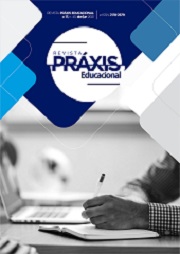Do videos about science matter? A study with students from basic education
DOI:
https://doi.org/10.22481/praxisedu.v17i45.6894Keywords:
Non-formal Education, Science Popularization, Audiovisual ReadingAbstract
Nowadays, digital technologies have multiplied the flow of communication and information around the world. Considering the digital medium as one of the most important for the Science popularization, mainly through online videos, this research aimed at investigating habit aspects, interestings and perceptions from Basic Education students about videos related to Science issues. This is an exploratory research that was performed with 160 students from semiarid region in Alagoas. For the data gathering was used a questionnaire containing open and multiple-choice questions. The findings pointed out that students mainly watch videos for fun, but videos that present scientific themes were very representative. The students also highlighted the importance of videos with scientific themes, in spite of watching such materials rarely. They also considered learning from videos and recognized them as a pedagogical possibility for teachers. The videos are configured in a new cultural dimension in which different scenarios and perspectives for science education and popularization, whose processes need to be questioned.
Downloads
Metrics
References
ARROIO, Agnaldo. Is media literacy an urgent issue in education for all? Problems of Education in the 21st Century, v. 15, n. 5, p. 416-418, 2017.
BARDIN, Laurence. Análise de conteúdo. Lisboa: Edições 70, 2011.
CENTRO DE GESTÃO E ESTUDOS ESTRATÉGICOS - CGEE. Percepção pública da C&T no Brasil – 2019. Resumo executivo. Brasília, DF: 2019. 24p
COELHO, Pollyanna Jericó Pinto; ALVES, Jefferson Fernandes. Visões camaleônicas: vantagens e limites do uso do vídeo no processo de ensino - aprendizagem. Linguagens, Educação e Sociedade, n. 13, p. 111-121, 2005.
ESCOBAR, Herton. Divulgação científica: faça agora ou cale-se para sempre. ComCiência, dossiê 197, abril/2018. Disponível em: http://www.comciencia.br/divulgacao-cientifica-faca-agora-ou-cale-se-para-sempre/. Acesso em 05 de junho de 2020.
FERRÉS, Joan. Vídeo e Educação. Porto Alegre: Artmed, 2. Ed, 1996.
FRANCISCO JUNIOR, Wilmo Ernesto; BENIGNO, Ana Paula Aquino. Produção de vídeos amadores de experimentos: algumas contribuições para se pensar o processo educativo. Revista Exitus, v. 8, n.2, p. 244-272, 2018.
GUIMARÃES, Margaret de Oliveira. Comunicação e educação: a perspectiva do receptor. Comunicação e Educação, v. 20, p. 15-20, 2001.
GUTIERREZ, Francisco. Linguagem total: uma pedagogia dos meios de comunicação. São Paulo: Summus, 1978.
HALL, Stuart. Encoding/Decoding. In: HALL, Stuart; HOBDON, Dorothy; LOWE, Andrew; Willis, Paul (Org.). Culture, Media, Language. London: Hutchinson, 1980. p. 128-138.
JORM, Christine; ROBERTS, Chris; GORDON, Christopher; NISBET, Gillian; ROPER, Lucianda. Time for university educators to embrace student videography. Cambridge Journal of Education, v. 49, n. 6, p. 376-396, 2019.
LEON, Bienvenido; BOURKE, Michael. Investigating Science-Related Online Video. In: LEON, Bienvenido; BOURKE, Michael (Org.). Communicating Science and Technology Through Online Video. New York: Routledge, 2018. p. 1-14
MORAN, José Manuel. O vídeo em sala de aula. Comunicação e Educação, n. 2, p. 27-35, jan/abril. 1995.
MORAN, José Manuel. As Novas Tecnologias e Mediação pedagógica. 16ª Ed. Campinas: Papirus, 2009.
PEREIRA, Marcus Vinicius, BARROS, Susana de Souza, REZENDE FILHO, Luiz Augusto de Coimbra; FAUTH, Leduc H. de Almeida. Demonstrações experimentais de Física em formato audiovisual produzidas por alunos do ensino médio. Caderno Brasileiro de Ensino de Física, v. 28, n. 3, 676-692, 2011.
REVISTA VIRTUAL DE QUÍMICA. Instruções aos autores. Disponível em: http://rvq.sbq.org.br/conteudo.asp?page=2. Acesso em 16 de junho de 2020.
REZENDE FILHO, Luiz Augusto de Coimbra; BASTOS, Wagner Gonçalves; PASTOR JUNIOR, Américo de Araújo; PEREIRA, Marcus Vinicius; SÁ, Marcia Bastos de. Contribuições dos estudos de recepção audiovisual para a educação em ciência e saúde. Alexandria: Revista de Educação em Ciências e Tecnologia, v. 8, p.143-161, 2015.
SUGIMOTO, Cassidy; THELWALL, Mark. Scholars on soap boxes: Science communication and dissemination in TED videos. Journal of the American Society for Information Science and Thechnology, v. 64, n. 4, p. 663-674, 2013.
THELWALL, Mark, SUD, Pardeep; VIS, Farida. Commenting on YouTube videos: From Guatemalan rock to El Big Bang. Journal of the American Society for Information Science and Technology, v. 63, n. 3, p. 616-629, 2012.
WHITE, Robert A. Recepção: a abordagem dos estudos culturais. Comunicação e Educação, v. 12, p. 57-76, 1998.
WILLIAMS, Maria Gallardo; MORSH, Layne A.; PAYE, Ciana; SEERY, Michael K. Student-generated video in chemistry education. Chemistry Education Research and Practice. v. 21, p. 488-495, 2020.
Downloads
Published
How to Cite
Issue
Section
License
Copyright (c) 2021 Práxis Educacional

This work is licensed under a Creative Commons Attribution-ShareAlike 4.0 International License.
You are free to:
Share - copy and redistribute the material in any medium or format; Adapt - remix, transform, and build from the material for any purpose, even commercially. This license is acceptable for Free Cultural Works. The licensor cannot revoke these freedoms as long as you follow the terms of the license.
Under the following terms:
Attribution - You must appropriately give credit, provide a link to the license, and indicate if any changes have been made. You may do so in any reasonable way, but not in a way that suggests that you or your use is endorsed by the licensor.
There are no additional restrictions - You cannot apply legal terms or technological measures that legally restrict others to make any use permitted by the license.










